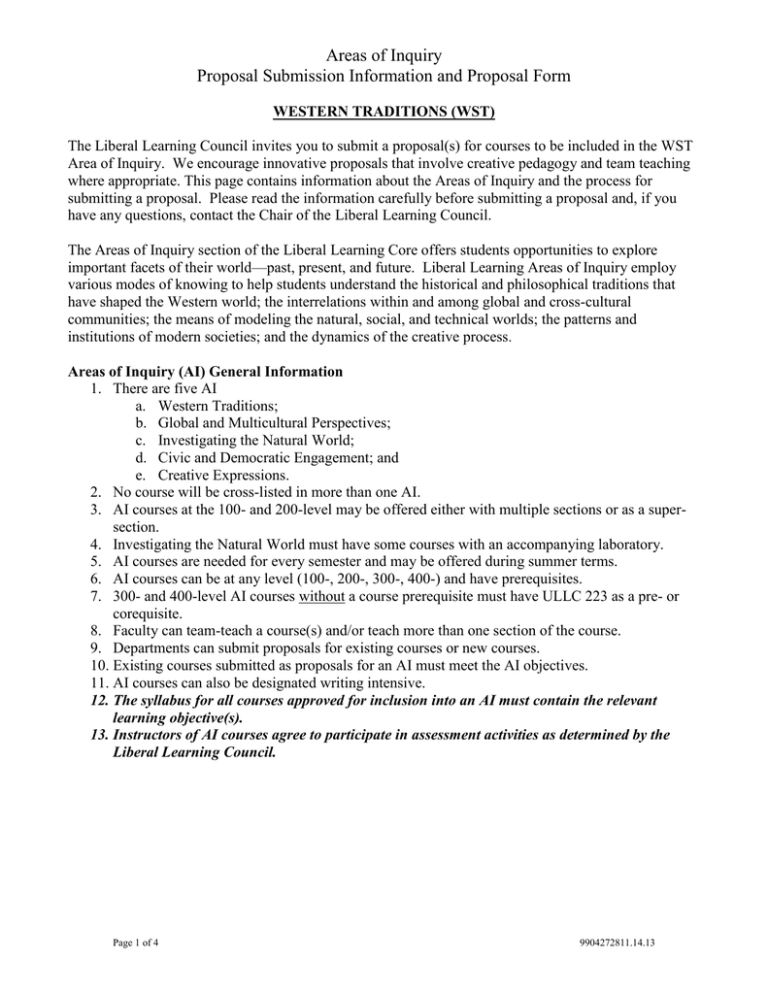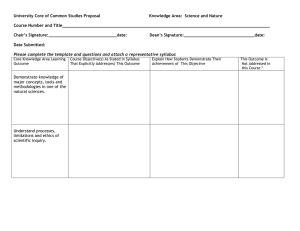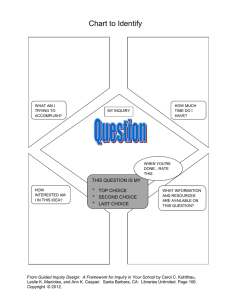Areas of Inquiry Proposal Submission Information and Proposal Form
advertisement

Areas of Inquiry Proposal Submission Information and Proposal Form WESTERN TRADITIONS (WST) The Liberal Learning Council invites you to submit a proposal(s) for courses to be included in the WST Area of Inquiry. We encourage innovative proposals that involve creative pedagogy and team teaching where appropriate. This page contains information about the Areas of Inquiry and the process for submitting a proposal. Please read the information carefully before submitting a proposal and, if you have any questions, contact the Chair of the Liberal Learning Council. The Areas of Inquiry section of the Liberal Learning Core offers students opportunities to explore important facets of their world—past, present, and future. Liberal Learning Areas of Inquiry employ various modes of knowing to help students understand the historical and philosophical traditions that have shaped the Western world; the interrelations within and among global and cross-cultural communities; the means of modeling the natural, social, and technical worlds; the patterns and institutions of modern societies; and the dynamics of the creative process. Areas of Inquiry (AI) General Information 1. There are five AI a. Western Traditions; b. Global and Multicultural Perspectives; c. Investigating the Natural World; d. Civic and Democratic Engagement; and e. Creative Expressions. 2. No course will be cross-listed in more than one AI. 3. AI courses at the 100- and 200-level may be offered either with multiple sections or as a supersection. 4. Investigating the Natural World must have some courses with an accompanying laboratory. 5. AI courses are needed for every semester and may be offered during summer terms. 6. AI courses can be at any level (100-, 200-, 300-, 400-) and have prerequisites. 7. 300- and 400-level AI courses without a course prerequisite must have ULLC 223 as a pre- or corequisite. 8. Faculty can team-teach a course(s) and/or teach more than one section of the course. 9. Departments can submit proposals for existing courses or new courses. 10. Existing courses submitted as proposals for an AI must meet the AI objectives. 11. AI courses can also be designated writing intensive. 12. The syllabus for all courses approved for inclusion into an AI must contain the relevant learning objective(s). 13. Instructors of AI courses agree to participate in assessment activities as determined by the Liberal Learning Council. Page 1 of 4 9904272811.14.13 Submission Process for Each Proposed Course 1. Read the information above and the course description and goals for WST. 2. Develop a syllabus (which must contain the learning objective for the WST Area of Inquiry) 3. Complete the course proposal form for Western Traditions that begins on the next page. 4. If this is a new course, complete the Undergraduate Curriculum Course Proposal Form. This form is needed only if the course is a new course. The Undergraduate Curriculum Change to Existing Course form is needed if the course is not new, but the course number or title is changed. 5. By the deadline, submit the items below to your Department Chairperson and Departmental Curriculum Point Person as both electronic and hard copy. Page 2 of 4 9904272811.14.13 Proposal Tracking # Department Course Number Submission Checklist Proposal Syllabus Course Name: UCC Proposal for new course Check box for Honors course consideration AREA OF INQUIRY WESTERN TRADITIONS This form must be submitted to the Liberal Learning Council as part of the submission process. Please attach a proposed syllabus for this course and the Undergraduate Curriculum Course Proposal Form, if new course. DEADLINE FOR PROPOSALS: 1 October of the Academic Year Proposals must be approved at the department level by 10/1 Check Only One: This course already exists in the curriculum and we are now proposing it for inclusion in this Area of Inquiry. This course already exists in this Area of Inquiry and is being submitted for recertification. This is a new course that we are proposing for this Area of Inquiry. 1. Name and contact information of the curriculum point person for the department administrating this course. 2. In any given semester, how many sections of this course is your department willing to offer? 3. Why is this course being offered/what is it designed to achieve (Course purpose/goal)? 4. All courses must address the following learning objective: At the conclusion of an AIWT course, students should be able to explain the foundations of at least two Western ideas, events, or artistic movements through reference to primary works. Briefly explain how this class addresses the stated objective. Page 3 of 4 9904272811.14.13 5. Realizing course objectives: Check below how this course will accomplish the objective in #4 (choose at least one): Participating in class discussion and debate Engaging in teamwork and other collaborative exercises Writing analytical or evaluative papers, perhaps incorporating original research Making oral presentations Creating an artistic product or a performance Participating in fieldwork Other means – please identify 6. Attach a proposed syllabus that includes: a) a statement of purpose, b) course objectives (including the learning objective for this Area of Inquiry) and how the objective will be accomplished, c) textbooks and reference information, d) a weekly content and assignment calendar, e) a grading schematic and any additional information relevant to this decision** 7. Explain how this course connects to The Goals for Liberal Learning (http://www.cnu.edu/liberallearning/faculty/index.asp). Page 4 of 4 9904272811.14.13


